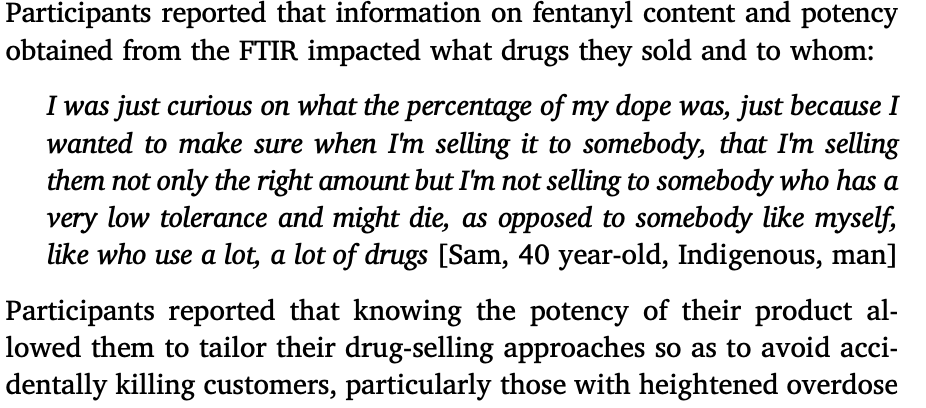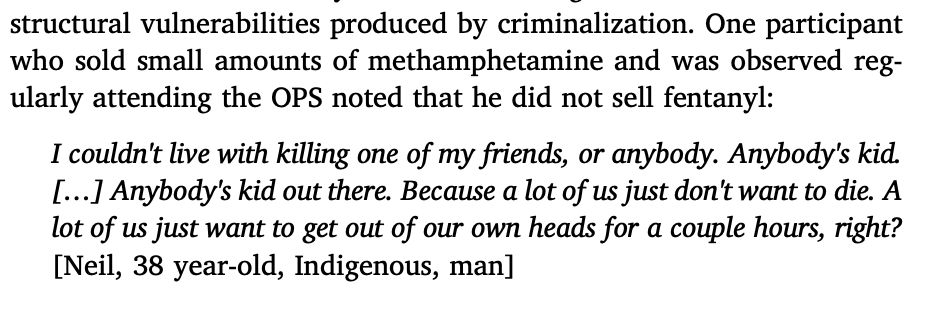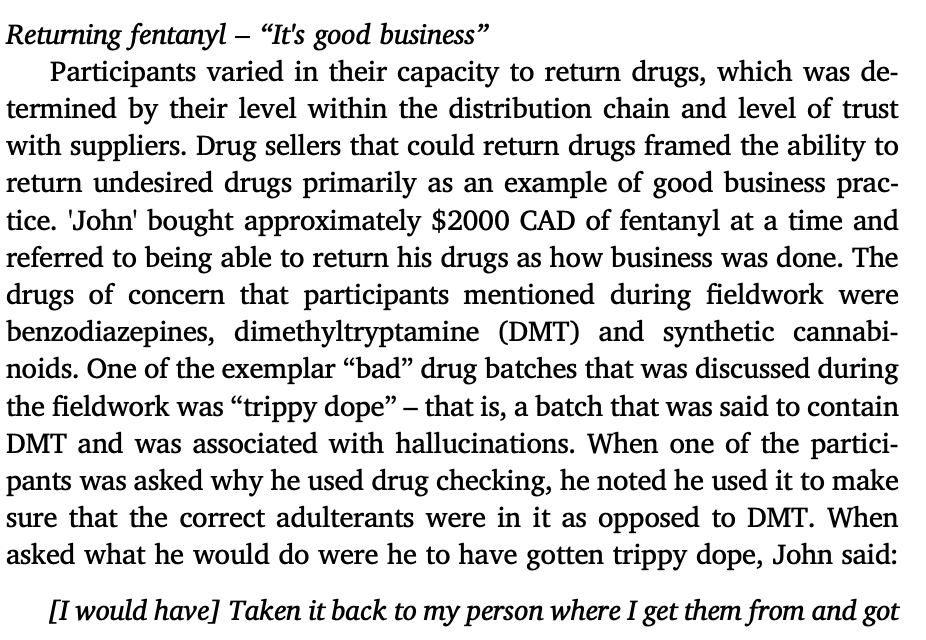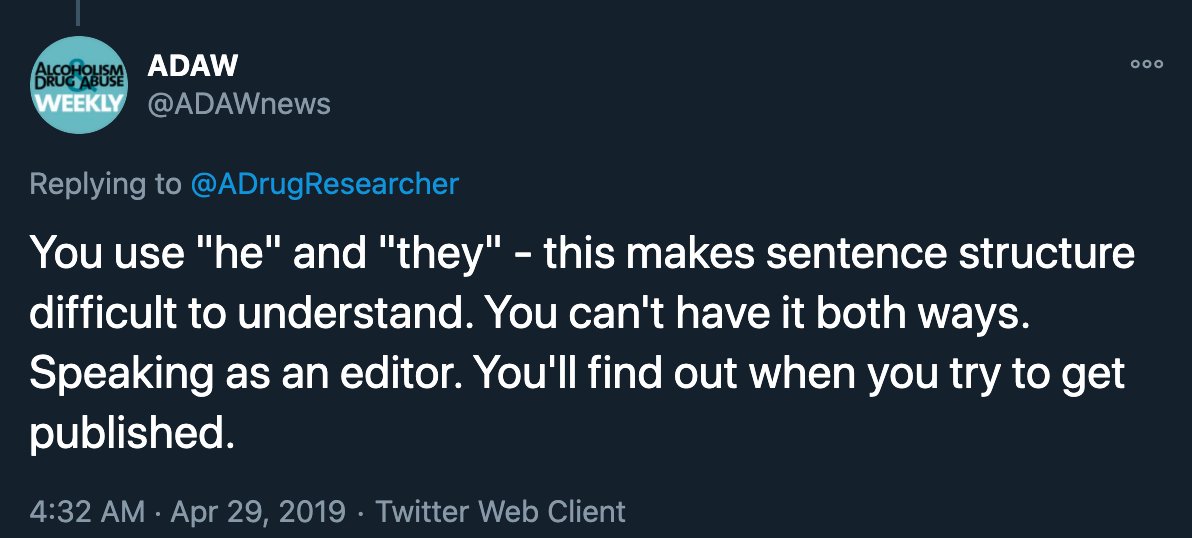I& #39;ve been waiting for this paper to come out for what feels like forever. I& #39;m so excited I get to share it with you. I need to settle down, but then I& #39;ll write out a thread
Just so this doesn& #39;t get lost at the bottom, now and always you can DM me for a copy 1/ https://twitter.com/RS_McNeil/status/1331390880918499330">https://twitter.com/RS_McNeil...
Just so this doesn& #39;t get lost at the bottom, now and always you can DM me for a copy 1/ https://twitter.com/RS_McNeil/status/1331390880918499330">https://twitter.com/RS_McNeil...
This paper is the 1st of 3 that I hope to have in the next year or so. It comes out of interviews @jennav5 and I conducted at an OPS in 2018-2019 (I did my last interview 2 days b4 flying to Amsterdam). 2/ https://www.sciencedirect.com/science/article/pii/S0955395920301869?dgcid=author">https://www.sciencedirect.com/science/a...
I should start by saying that we had no intention of looking at the specific experiences of people who sell drugs, the origin of the project was to look at the motivations for using drug checking (DC) 3/
It was a bit of unexpected, but when we realized that many sellers were willing to explain their experiences that extended beyond drug selling. I& #39;ve kept mum about this data for the most part because of the sensitivity of the content 4/
It& #39;s worth keeping in mind that a lot of W. European drug checking discourages engaging with pw sell drugs. This paper, challenges the justification for doing so 5/
Common discourses towards sellers treats them as the indifferent/exploitive to the people who they sell drugs to. The myth of drug sellers has been covered elsewhere, but our paper looks at sellers actively engaged in harm reduction practices and some of the implications 6/
Sellers often face the same structural vulnerability and violence, other research has demonstrated how police presence around OPS can lead people who use drugs not to use them - despite that, come to get their drugs checked 7/
What we found is that sellers were motivated to get their drugs checked for a couple of reasons. One aspect was personal use, as sellers often used the drugs they sold (another indicator of strength)
Earlier research looking at the fent strips found a low interest in them, likely because people who buy "down" know they are buying fentanyl, if the FTIR were only used for qual analysis (what drugs), it would be less useful 9/ https://www.ncbi.nlm.nih.gov/pmc/articles/PMC6131768/">https://www.ncbi.nlm.nih.gov/pmc/artic...
One note on the FTIR is that it offers semi-quantitative mixture analysis (not going to go into that), but basically it provides a rough % of the mixture. The % and the ability to provide it to people they sold too was a strong driving factor 10/
In part, knowing the % was useful for communication to clients, and making sure to provide the right strength to the right person/make sure they would at least be aware 11/
This is a shock to no one who knows/has known a person who sells drugs, but, those who sell drugs aren& #39;t abstracted from the community they are embedded in it. Some of the people they sell to are their friends, family members neighbours 12/
There& #39;s a great paper by @geoffbardwell on trust and selling (as well as many new ones!). But what we found was that simply having the results did not create trust, reputation (being able to trust who communicates those results was more crucial) 13/ https://pubmed.ncbi.nlm.nih.gov/30856370/ ">https://pubmed.ncbi.nlm.nih.gov/30856370/...
Kind of like how you don& #39;t trust BoB675907 on Twitter who swears he has a PhD in biology because he says so, sellers themselves noted that they would not use the notes to try to sell, and that even they wouldn& #39;t trust them, unless it was someone they knew 14/
I& #39;ve really buried the lede here, because the most interesting part of this paper, is at the end, and it& #39;s why we really need to start working with people who sell drugs -and the idea they shouldn& #39;t check their drugs is harmful 15/ https://www.sciencedirect.com/science/article/pii/S0955395920301869?dgcid=author">https://www.sciencedirect.com/science/a...
The section, "Modifying Markets" looks at how sellers can impact the market in a positive way! First, some, but not all, sellers were able to return or modify dangerous batches of substances they had purchased 16
By dangerous here, I mean 2 things: 1. Batches of fentanyl that have dangerous adulterants in them. 2. highly potent fentanyl batches.
Here I want to be cautious and note this was a subsample of all the people we interviewed, and this was an even smaller group 17/
Here I want to be cautious and note this was a subsample of all the people we interviewed, and this was an even smaller group 17/
On the 1st, there was a degree to which some sellers were able to return drugs to their suppliers. This was often referred to as just, "good business" 18/
2. Now, here we had a really limited (2-3 people) who discussed the use of non-psychoactive buffs and I want to be cautious. While writing, we agreed that "excipient" rather than adulterant was useful to refer to the use of these compounds (mannitol + caf) 19/
& #39;John& #39;, who brought in a sample to get it tested after he saw someone go to the hospital from a similar-looking batch, explained the process, of making high potency fent "street safe" - by lowering the percentage to the average he could protect his clients 20/
- this is why when the police say they found 90% pure fentanyl like it would be sold that way they& #39;re full of.. well... you can guess the rest. 21/
We go into the implications of the paper at the end. Similarly, to a great paper by @gilliankolla (came out right after we finished review), harm reduction needs to include people who sell drugs 22/ https://www.ncbi.nlm.nih.gov/pmc/articles/PMC7206732/">https://www.ncbi.nlm.nih.gov/pmc/artic...
In it, we write: "public health must reimagine the relationship between harm reduction and drug sellers to more directly affect the fentanyl drug market" - this work is now already being done by @burek75 and the UVic team  https://abs.twimg.com/emoji/v2/... draggable="false" alt="♥️" title="Herz" aria-label="Emoji: Herz"> 23/
https://abs.twimg.com/emoji/v2/... draggable="false" alt="♥️" title="Herz" aria-label="Emoji: Herz"> 23/
I& #39;d like to thank @RS_McNeil and @jennav5 for working so hard and putting a lot of trust in me to work with them back in the Fall of 2018, as well as @geoffbardwell Jade Boyd and Thomas Kerr for their feedback.
It means the world to me 24/
It means the world to me 24/
Finally, I& #39;d like to give a shout out to @ADAWnews - I was using they/he pronouns at the time this was submitted and had no challenges with @ijdrugpolicy - thanks for your concern though

 Read on Twitter
Read on Twitter






